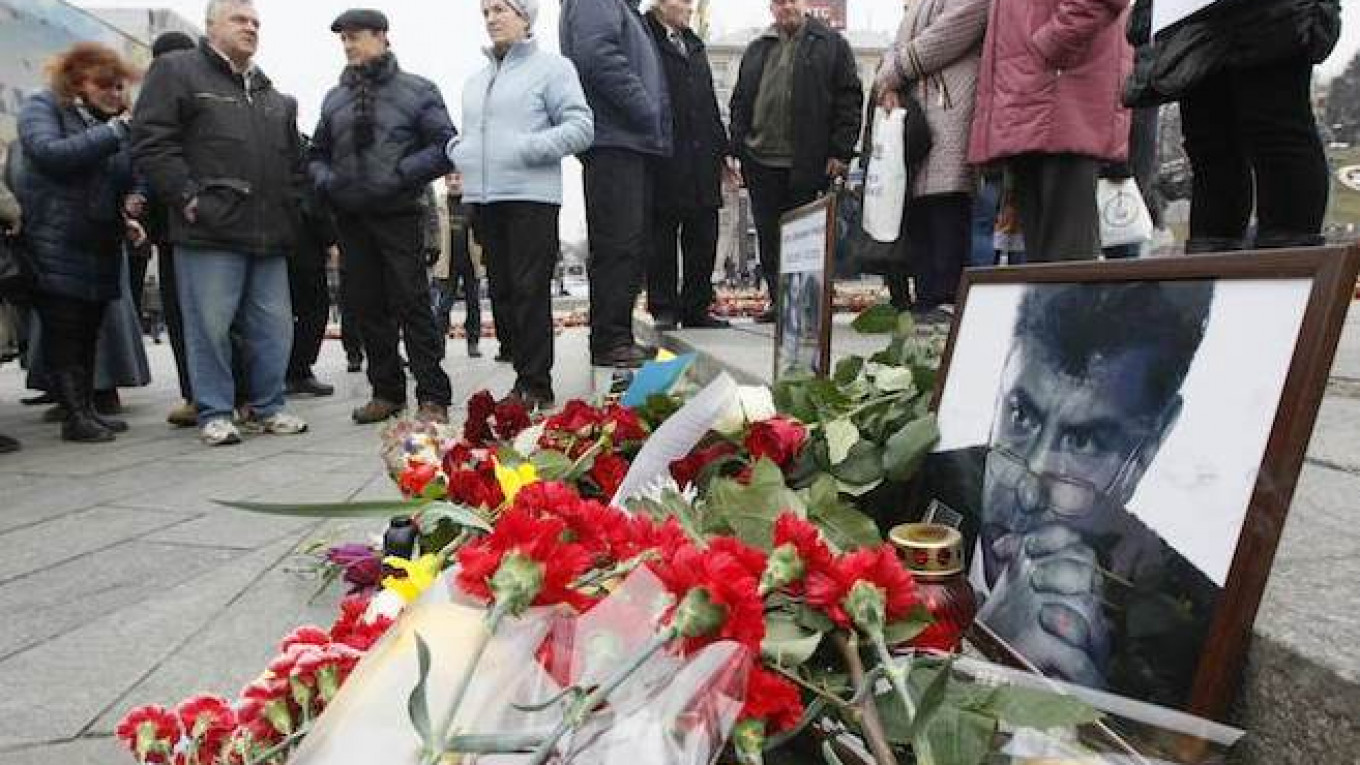Boris Nemtsov, 55, one of the most vocal political opponents of President Vladimir Putin, was shot dead outside the Kremlin on Friday night, revealing the deep sense of alienation between various political forces in Russia and showing how political divisions in the country can in a moment turn violent.
In what seems to have been a carefully planned assassination, the killers fired at least six bullets at Nemtsov as he walked across a bridge that leads off Red Square over the Moskva River and offers one of the most stunning views of the Kremlin.
Russia's Investigative Committee said in a statement Saturday that investigators are currently working on two main theories: The murder was either an attempt to destabilize the political situation in Russia or was conducted by Islamic extremists in revenge for Nemtsov's stance over the Charlie Hebdo shooting in Paris.
Boris Nemtsov for The Moscow Times
Boris Nemtsov wrote a number of opinion pieces for The Moscow Times. You can read them here:
Putin Places Popularity Over People
Nemtsov was one of the most energetic and outspoken critics of Putin and his government over the last 15 years. He was a member of several opposition political parties and helped organize numerous political rallies in Moscow and around Russia.
The politician was among the leading figures of the 2011-2012 protests that brought up to 100,000 onto Moscow's central streets and squares to demand that Putin leave office.
Since the Ukraine crisis has unfolded, unleashing a wave of patriotic fervor, Nemtsov and the oppositional movement overall have lost much of their support among the general public.
Only 15 percent of respondents said they sympathized with politicians such as Nemtsov, Mikhail Kasyanov, Alexei Navalny and other opposition figures, according to a survey published by the Levada Center independent pollster Friday. In contrast, 68 percent said they did not sympathize with them.
The poll was conducted among 1,600 respondents across Russia with a margin of error not exceeding 3.4 percent.
Nemtsov and his allies blamed their lack of popular support on the media landscape in Russia, where all major TV stations are owned by Kremlin-friendly entities.
Pro-government media outlets have intensified their efforts to undermine and discredit any signs of dissent in Russia in the past few years, contributing to the deep sense of alienation and mistrust among various social groups in the country, Alexei Makarkin, deputy director of the Moscow-based Center for Political Technologies think tank, told The Moscow Times in an interview on Saturday.
"Anti-liberal propaganda has fostered the sense of mutual hatred in society. What we have is a situation that could detonate at any moment," he said.
"This killing demonstrates to what extent hatred has been legitimized or even sanctioned in Russia. Society was irritated for a long time, but when the hatred comes from TV screens, it makes a big difference," he added.
Makarkin specifically pointed to emotive and incendiary media coverage of the Ukraine conflict, saying it had separated society into "patriots" and "enemies."
Nemtsov, who had accused Putin of waging a war against Ukraine and opposed Russia's annexation of the Crimea Peninsula from Ukraine last year, was emphatically placed in the category of enemies. He had been planning to publish a report on Russia's direct involvement in the fighting in Ukraine's east.
Together with his political allies, Nemtsov has accused Putin of rampant corruption, claiming that he enjoys a life of immense luxury with personal palaces, yachts and aircrafts at his disposal. The Kremlin has repeatedly dismissed these accusations.
"Regardless of who killed Nemtsov, it's perfectly clear why this murder was committed. It was done simply to demonstrate the 'structure of the situation,'" Alexander Morozov, a political scientist and editor-in-chief of the online magazine Russian Journal, wrote on his Facebook page.
"The structure of the situation demands that there must be killings, and the more killings, the better," he wrote.
Click here for photogalleries:
A Message from The Moscow Times:
Dear readers,
We are facing unprecedented challenges. Russia's Prosecutor General's Office has designated The Moscow Times as an "undesirable" organization, criminalizing our work and putting our staff at risk of prosecution. This follows our earlier unjust labeling as a "foreign agent."
These actions are direct attempts to silence independent journalism in Russia. The authorities claim our work "discredits the decisions of the Russian leadership." We see things differently: we strive to provide accurate, unbiased reporting on Russia.
We, the journalists of The Moscow Times, refuse to be silenced. But to continue our work, we need your help.
Your support, no matter how small, makes a world of difference. If you can, please support us monthly starting from just $2. It's quick to set up, and every contribution makes a significant impact.
By supporting The Moscow Times, you're defending open, independent journalism in the face of repression. Thank you for standing with us.
Remind me later.


